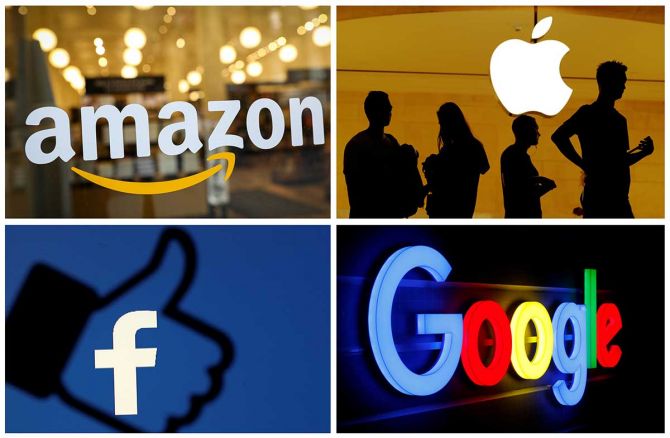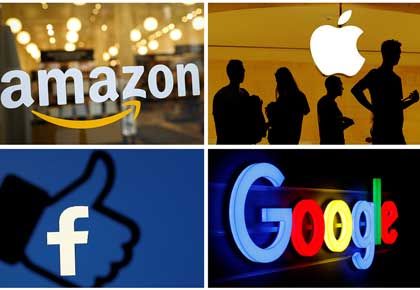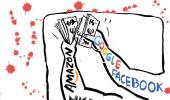Are the big five using their dominance to shut out rivals? That is the key question, says Prosenjit Datta.

Has Big Tech become too powerful?
Should Facebook, Google (Alphabet), Apple, Microsoft and Amazon be broken up?
After US Senator Elizabeth Warren put forward her proposal, the idea has gathered traction on both sides of the US political divide.
Antitrust hearings are taking place against the big five companies.
In India, the hearings have generated only passing interest.
After all, the companies are US-headquartered and it is easy to overlook the implications of the various potential outcomes of the hearings in the US for the Indian technology ecosystem and policymakers.
First, here is the background to the hearings.
The US has a long history of antitrust action to ensure that no private company becomes too powerful.
The first US Antitrust Act was the Sherman Act, enacted in 1890 and later bolstered with the Federal Trade Commission Act (FTC) and the Clayton Act.
Antitrust hearings in the past broke up Standard Oil and AT&T and put restrictions on others such as IBM and Microsoft from extending their dominance.
The US Antitrust cases initially focused on how market dominance would lead to higher price for consumers.
Later, a more nuanced view emerged.
Focusing just on the price paid by consumers is a useless measure in the technology industry where basic services are often free (Google, Facebook) or the cheapest (Amazon).
In the case of Microsoft and Apple, platform dominance leads to issues of preferential treatment to own products.
The current case against Big Tech is unique equally for the issues that are important as well as those that are irrelevant.
The question of oligopoly or price fixing or overcharging the consumer does not arise.
As mentioned, Google and Facebook give away basic services free, Amazon ensures consumers pay low prices.
Equally, there is fierce competition between the five tech companies in different areas (Microsoft vs Google in search engines, OS and cloud, Microsoft vs Amazon in cloud and Artificial Intelligence, Facebook vs Google vs Amazon for a share of the advertising pie, Apple vs Microsoft vs Google in a gamut of mobile applications).
The key issues are as follows.
First, whether the big five are using their dominance to shut out rivals.
Amazon has driven smaller sellers to bankruptcy by copying their stuff and introducing them at cheaper prices under home labels.
Facebook bought up Instagram and WhatsApp when they were still small.
Apple, Microsoft and Google all use dominance to squeeze users of their ecosystems dry.
Also, while their services to consumers are often free or low priced, they collect loads of data that are then monetised leading to worries about privacy and data misuse.
There are three potential outcomes of the hearings: An order to maintain status quo, an order to break up the companies or the third option -- to place curbs on them and force them to share innovations with rivals.
Either way, the implications for India and other countries will be significant.
If the status quo is maintained, it would mean the two tech camps -- one based in Silicon Valley and the other in China (Alibaba, Baidu, Tencent, among others) would maintain their balance of power and every other country would be part of one or the other.
If Big Tech is broken up, while the Chinese would gain, it would also open up opportunities for the Indian tech companies -- and those from other countries -- to play at the highest end of the tech market on a far more equal footing, whether in the area of Artificial Intelligence platforms or social media ecosystems or mobile applications.
The third option -- forcing the big tech companies to share their patents for free and putting restrictions on their operations, though unlikely, would also help innovation and the rise of newer tech companies.
The Bell Labs ruling allowed patents for inventions such as the transistor and lasers to be available freely to engineers in US companies, which allowed the rise of start-ups such as Fairchild Semiconductors and Intel.
The restrictions placed on IBM gave a chance for Bill Gates and Paul Allen to build Microsoft.
Two decades later, antitrust hearings against Microsoft kept it from being too dominant on the Internet front and allowed the rise of Google and others.
For the Indian policymakers, the hearings are also important because it throws up issues on data collection and privacy.
More importantly, it could lead to a better understanding of dominance, something that Indian regulators have not had to deal with seriously, despite the Monopolies and Restrictive Trade Practices Act (MRTP Act) of 1969 and the current Competition Commission of India Act.
Till the mid-1980s, monopolies and oligopolies in any industry in India happened because of government policy -- by virtue of the licences issued.
At best, the cases dealt with price fixing and unfair market actions.
The only real case of market dominance came up when telecom players complained that Reliance Industries Ltd (RIL) used its dominance in other sectors (petrochemicals, refining) to offer free services in telecom to enter the market.
However, the Competition Commission of India (and Telecom Regulatory Authority of India) had ruled in favour of RIL because it was a new entrant in telecom.
The hearings in the US could help Indian regulators understand the nuances of the issue better -- if they so desire.
Prosenjit Datta is former editor of Business Today and Businessworld and founder and editor of Prosaicview, an editorial consultancy.
Feature Production: Ashish Narsale/Rediff.com












